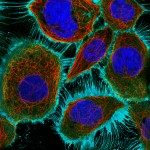Lien vers Pubmed [PMID] – 35716426
Lien DOI – S0171-9335(22)00052-810.1016/j.ejcb.2022.151249
Eur J Cell Biol 2022 Jun; 101(3): 151249
Actin is among the most abundant proteins in eukaryotic cells and assembles into dynamic filamentous networks regulated by many actin binding proteins. The actin cytoskeleton must be finely tuned, both in space and time, to fulfill key cellular functions such as cell division, cell shape changes, phagocytosis and cell migration. While actin oxidation by reactive oxygen species (ROS) at non-physiological levels are known for long to impact on actin polymerization and on the cellular actin cytoskeleton, growing evidence shows that direct and reversible oxidation/reduction of specific actin amino acids plays an important and physiological role in regulating the actin cytoskeleton. In this review, we describe which actin amino acid residues can be selectively oxidized and reduced in many different ways (e.g. disulfide bond formation, glutathionylation, carbonylation, nitration, nitrosylation and other oxidations), the cellular enzymes at the origin of these post-translational modifications, and the impact of actin redox modifications both in vitro and in vivo. We show that the regulated balance of oxidation and reduction of key actin amino acid residues contributes to the control of actin filament polymerization and disassembly at the subcellular scale and highlight how improper redox modifications of actin can lead to pathological conditions.




